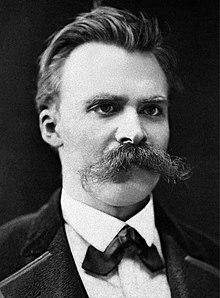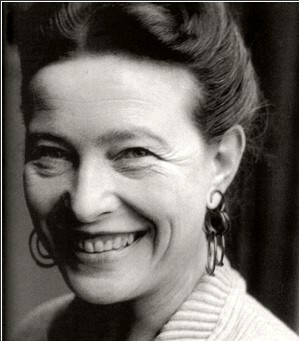Nietzche and the quest for meaning
 |
| The boy himself. Strong contender for the world's greatest mustache-wearer |
Anyone who knows me knows that I am absolutely obsessed with Nietzche, who I feel has been unjustly demonized both by religious people (who are so offended by "God is dead" that they stop listening, which is understandable. He could have phrased it differently) and by others who view him as a Nazi-sympathizer (which from the massive amount of study I've done seems to be because his sister Elisabeth was a Nazi and borrowed her brother's work in one of the most grotesque misappropriations the world has ever seen). Sorry (not actually- rhetorical sorry, but it's the thought that counts, right?), I'm a hard-core Nietzche fan and am deeply fascinated with his ideas. In my opinion, if someone read his "Thus spoke Zarathustra" and Simone de Beauvoir's "Ethics of Ambiguity," that would pretty well capture my perspective of what Existentialism is. Sorry, Sartre (again, only rhetorical sorry), your ideas are amazing as well, I just can't bring myself to adopt the view that "hell is other people" because it seems terribly sad.
So where were we? Nietzche. The boy himself. I want to focus on a very specific aspect of Nietzche today that I find incredibly useful as a model of understanding the human experience. Unfortunately, in order to actually talk about this idea, we also have to discuss why Nietzche thought God was dead.
God is dead
To most religious people, this statement comes as a threat to their identity, and so they take it very personally instead of trying to understand it. Nietzche has been misquoted so many times I want to cry (and have. Nietzche, my tears are for you- little bipolar boy tears. I hope you enjoy them). If you read literally the rest of the sentence, what you'll find is that Nietzche actually said "God is dead and we have killed him." To me, if you're, for example, a Christian there is no problem with this statement. To be a Christian is to admit that mankind literally took God and nailed him to a cross and killed him- they just think he came back.
So what did Nietzche mean? Keep in mind this, is just my personal interpretation of Nietzche, which you are free to disagree with. What Nietzche meant was that humanity had come to a point where the belief in a man in the sky as a source of meaning was no longer working to help people understand the world around them. We had science. We had technology. We had the looming threat of Facism. And God didn't seem to Nietzche to be a useful way of understanding the world anymore.
Nietzche found himself in a world devoid of meaning, what he called "Nihilism" (again, very easily misinterpretted), and no matter what worldview he tried adopting he found that it eventually destroyed itself. For example, if you see "truth" as the ultimate source of meaning, there will come a day when you will require an explanation some explanation of why truth should be the source of meaning. No matter how hard you try, you will never find a grounding for why truth should serve this role. It's really interesting to me to note that Immanuel Kant, that beautifully-difficult-to-read thinker of old also shared this view. The difference is that Kant tried to put God into this role of meaning-giver, which Nietzche didn't think worked (a view I personally share).
To Nietzche, it seemed arbitrary. He understood that no matter what you used to fill the role of meaning-giver, you could never give a reason for why someone else should feel compelled to do the same (at least not a logically-sound one).
 |
| I'll never be able to understand why Google thought this was a good picture of "meaninglessness," but it really works. Don't be a crushed soda can. You deserve better. |
This is, in my opinion, the core insight of existentialism. The human condition is not a one-size-fits-all type of thing. We all must decide for ourselves where meaning will come from. The pain of not doing so is unbearable. And for Nietzche, God as he understood him just didn't cut it (makes sense when you think about how horribly warped most religions have allowed their God to become- a cheap imitation of the real thing).
| Can we get a Darwin-expert in here? I think we may have been wrong about the course of evolution. |
The stages of development
So what did Nietzche's views inspire him to view as the progression of life? Nietzche? (Look to the right- it's literally right
there). Nietzche saw all humans as being born as camels, which a cruel world had strapped all sorts of values to against their will. You're forced to carry all sorts of identities- gender, religion, race, nationality, being ugly (oh wait, that's just me. Kidding, but am I really?). You didn't pick these identities. They were given to you by society and they may not be the things you want to have to identify as (no one wants to opt in to systematic oppression).
To Nietzche, Nihilism was the realization that "why the heg to I have to carry this heavy stuff? It's not something I want to carry and no one seems to be appreciating me for carrying it. Like a weird animorph (please tell me you remember those books- absolute genius), this realization magically transforms you into a lion.
A lion has a sense of dignity. He's not carrying anything he doesn't want to. Nietzche saw this as negative "Nihilism"- a Nihilism which is so angry at the world for thinking it was a camel and not a human being (currently in lion form) that it lashes out and seeks to destroy the values it was once forced to carry. Unfortunately, the Lion's anger isn't easily contained. Once it has a taste for blood, you may not be able to stop it. The Lion can become addicted to the power it feels and seek sweet vengeance on the cruel world that treated it like a camel. It lashes out at everyone around it. We can see many people doing this today- that's pretty much what crime is: a feeling that the world has only ever kicked you while you were down so why should you care about those around you.
But if you're lucky, there is a final stage in Nietzche's model (not really a surprise. I already showed you the diagram spib). Eventually you realize that there is more to life than vengeance. To Nietzche you became a child. My Christian readers may note that Christ said "to enter the kingdom of heaven you must become like a little child." [Coincidence? Could it be possible that maybe Nietzche isn't the monster you thought he was? No. Definitely not, you're right. Sorry for being so stupid.] <- rhetoric.
A child doesn't care what other people think. A child has an imagination. A child wants to play and explore and be happy. A child likes to fill the meaning-provider role with different things to explore them, which Nietzche referred to as "living experimentally."
Where I disagree with Nietzche
For Nietzche, that is what it is to be human. And I agree for the most part. But there's something missing. Sorry, Nietzche <- also rhetoric (it's quite a fun and useful thing, isn't it?)
We can't stay children forever. To be a child is to only think about yourself. To be a child is to refuse to acknowledge responsibility for anyone but yourself. If we want to make the world a place worth living in, we need to allow ourselves to be shackled. We have to grow up and realize that being an adult is really the same thing as being a camel. Because the only thing more satisfying than being a child is carrying the burdens of someone else, as long as those are burdens you actually want to carry.
 |
| "Don't worry Nietzche, the identity I was shackled with helped to realize we can both share the spotlight" |
I wish I could take credit for this idea, but it's not actually mine. The real genius here (and the reason she's my heroine- not the drug) is Simone de Beauvoir, who saw this more than 50 years ago. To me, it's a deeply beautiful thing that, in my opinion, the clearest thinker the world has ever seen was a woman. Men could learn from her. I've actually got a deeply intriguing hypothesis about our heroine Simone, but that's a different story for a different blog post.
Good talk.
Comments
Post a Comment